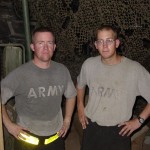 Jay Ellsasser has sent in a few of his articles for publication in the Your-Articles section.
Jay Ellsasser has sent in a few of his articles for publication in the Your-Articles section.
The third is entitled The Long Run.
The Long Run By Jay Ellsasser under Your Articles
The long run is an essential ingredient for anyone training for a marathon, as it enables the body to adjust physiologically and psychologically to the rigors of distance running.
More to the point, long runs give you confidence while training your body to process energy more efficiently. To be more specific would risk the mention of medical technicalities that might sap the energy and interest of the reader, as well as the writer.
Moving on.
Long runs can range anywhere from 10 to 26 miles, depending on the proximity of race day.
Progressing to the pulsing rhythm of rock & roll, checking mile splits, adjusting pace and refueling on the run, you soon join the flat, traffic-congested expanse of Route 28 west with its long lines and short-tempered drivers.
Route 28, where the sign code has long since cracked under the pressures of crass commercialism. And while this roadway is anything but easy on the eyes, the flat terrain and accommodating sidewalks are very runner-friendly.
Turning south now, heading back across the Cape’s midsection along Higgins-Crowell Road and a brief stretch of Willow Street.
Past the half point, water bottle #2 retrieved, you join the rolling hills and narrow roadsides of picturesque f miles. And it is in these remaining miles where you push the body beyond what it remembers, running in relatively uncharted territory, excited to exhaustion.
Mistakes are made along the way in training and competition. But it can be said that failure paves the way for success, and it is always a road worth taking.
The oddities of preparing for such an excursion, in this case a 20-mile trek, often prove the difference between finishing the course or being forced to hail a cab halfway through the run, no small feat on Cape Cod.
Start with three 20-ounce bottles of water. A bottle discreetly placed near an easily recognizable landmark every 5 miles should suffice.
Be prepared for curious, even suspicious glances while placing each bottle on a stranger’s property. It’s best not to confuse the issue by explaining to interested onlookers the exact nature of this seemingly bizarre behavior. Just hope the bottles are still there when you swing by, tired and thirsty, later that day.
Then there’s food or fuel in the form of Power Bars or Power Gel, the latter being a substance of sustenance similar to energy bars but available in liquid form.
Distance running is a business of supply and demand where the main commodity is energy. As you burn fuel you burn energy, and water and nutritional supplements serve as your only sources of new fuel. Maintaining this balancing act is essential to any quality performance.
A recommended alternative source of energy includes new batteries for the Walkman and a carefully chosen mix of music. Music is entertainment, music is motivation.
Down the apartment steps, tape heads rolling, stopwatch ticking, and out on the road again.
Heading north now alongside the back nine of Bass River Golf Course on Highbank Road in Dennis. Then a brief detour through the winding, hilly topography of Long Pond Road where water awaits.





















Speak Your Mind